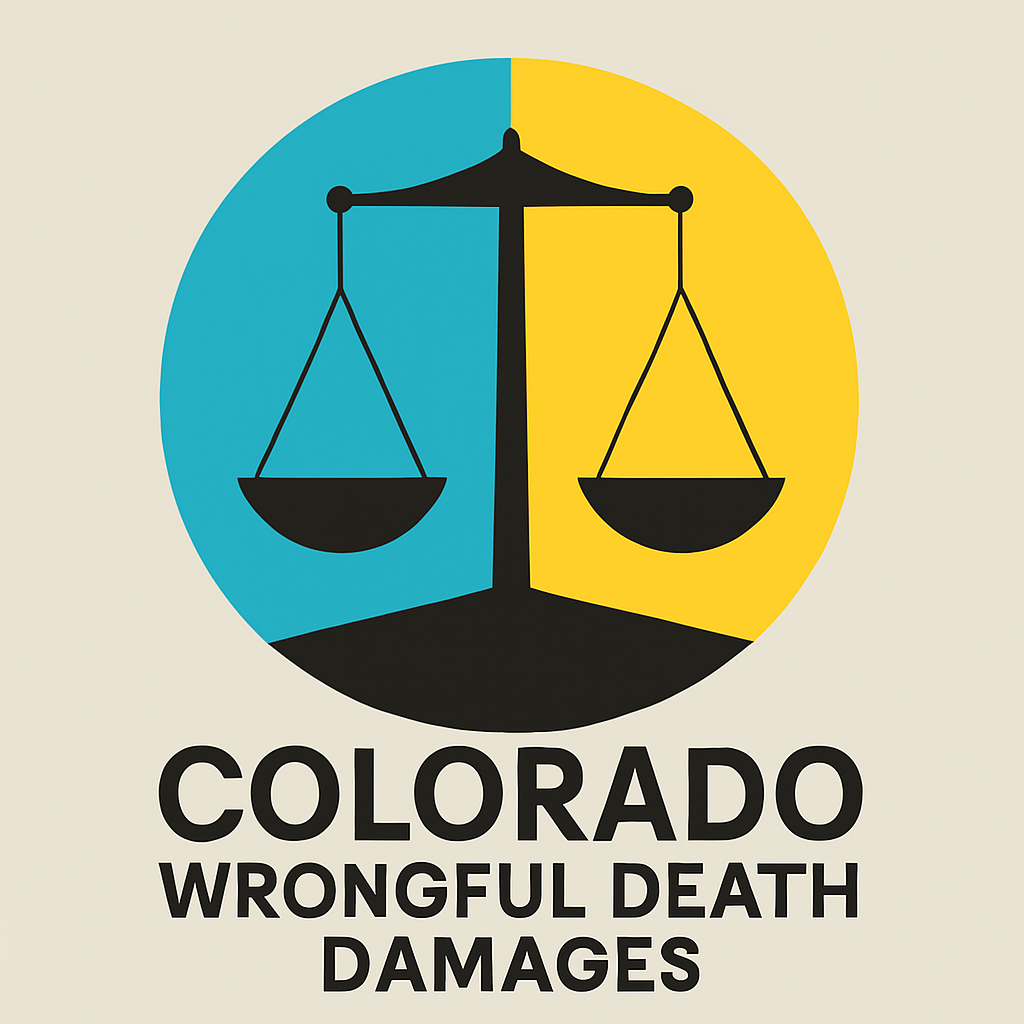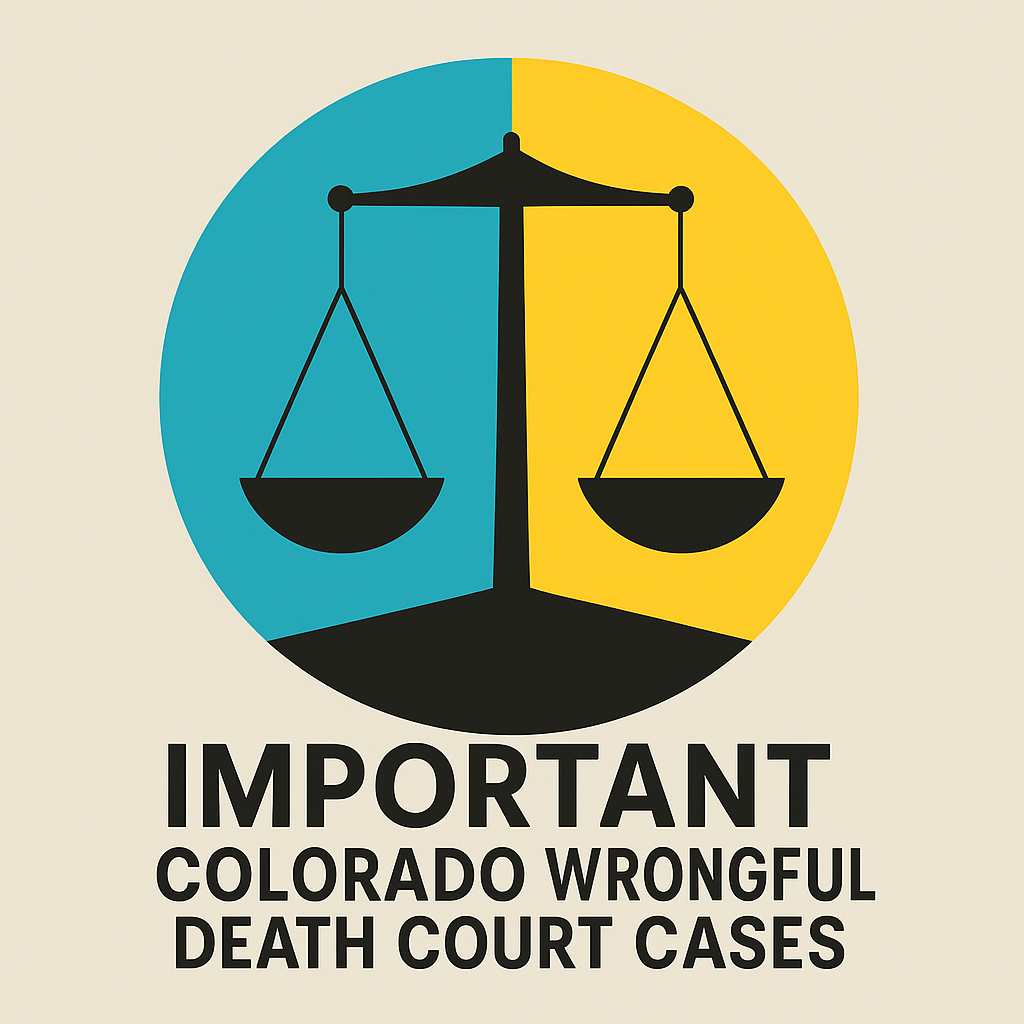When someone you love dies in an accident caused by another person’s carelessness, it can change your life forever. You might feel sad, worried, or even angry, and you could face big bills for medical care, funerals, and the loss of your loved one’s income.
A wrongful death lawsuit is one way for families to seek money (called “damages”) to help cover these costs and to hold the at-fault party responsible.
But how much is a wrongful death case worth in Colorado? That depends on many different things, like the laws, your loved one’s situation, and how the accident happened.

What Is a Wrongful Death Lawsuit in Colorado?
In Colorado, a wrongful death lawsuit happens when a person dies because of someone else’s “wrongful act, neglect, or default.”
This is covered by the Colorado Wrongful Death Act (WDA), found in C.R.S. § 13-21-202. It allows certain family members to seek money for their losses if their loved one’s death was caused by someone else’s carelessness, recklessness, or intentional harm.
A Colorado wrongful death claim can help:
- Cover Costs: Such as medical bills, funeral expenses, and the loss of the loved one’s future earnings.
- Hold People Accountable: By showing that carelessness has serious consequences, the law can encourage safer behavior in the future.
Who Can File a Wrongful Death Claim in Colorado?
Colorado law decides who is allowed to file a wrongful death lawsuit (C.R.S. § 13-21-201):
- First Year After Death: Only the person’s surviving spouse can bring the lawsuit.
- Second Year After Death: The spouse still has the right to file. Children or other named beneficiaries can also file if the spouse does not.
- No Spouse or Children: The person’s parents may bring the wrongful death claim.
Factors That Affect a Colorado Wrongful Death Case’s Value
No two cases are the same. Many things can change how much money a family might get in a wrongful death lawsuit:
Economic Damages
Medical bills before death, funeral costs, lost wages, and future support the loved one would have provided.
Non-Economic Damages
Emotional pain, loss of companionship, and the distress of losing someone close.
In Colorado, this can be limited by law (the “damages cap”), although there are exceptions. See C.R.S. § 13-21-203 and cases like Lanahan v. Chi Psi Fraternity (In re Lanahan), 175 P.3d 97 and Alhilo v. Kliem, 2016 COA 142.
Punitive (Exemplary) Damages
If the at-fault party acted very recklessly or on purpose, extra money might be awarded to punish them. The Colorado WDA sometimes allows this in serious cases, although it can be limited by the laws.
Age, Health, and Earning Potential
Courts look at how old your loved one was and what they might have earned over their lifetime.
Your Family’s Dependence
How much the family relied on the deceased for financial and emotional support.
Felonious Killing Exception
If a “felonious killing” occurred, certain caps might not apply. However, courts often decide this case by case.
What Is Colorado’s Wrongful Death Damage Cap?
Colorado has laws that limit the amount of non-economic (emotional) damages families can get in wrongful death lawsuits:
- Historic Cap (Per Claim): Usually about $250,000 (adjusted for inflation). See Lanahan and Alhilo.
- New Law Changes: A recent change raised the non-economic damages limit to $2,125,000 starting January 1, 2025 for general wrongful death claims. For claims against healthcare professionals, the cap increases to $1,320,000 starting in 2028. Always check current rules because these amounts can change.
- Choosing a Solatium: Under C.R.S. § 13-21-203.5, families can choose a set “solatium” of $50,000 for non-economic damages, plus certain costs. This option is sometimes simpler if you do not wish to prove specific emotional losses.
- Government Claims: If the wrongful death involves a government entity, the Colorado Governmental Immunity Act (CGIA) may limit damages to $150,000 (Steedle v. Sereff, 167 P.3d 135).
Winter Dangers in Colorado
Colorado winters often bring snow and ice. Car crashes can happen when drivers do not slow down or prepare for slick roads, and slip-and-fall accidents are more common on icy sidewalks or parking lots.
If someone dies because a driver was careless or a property owner did not remove ice, the family might have a wrongful death claim.
The Colorado Ski Safety Act can also shape wrongful death suits related to ski resorts. Courts have said that the WDA’s “felonious killing” exception typically does not apply in skiing cases (Stamp v. Vail Corp., 172 P.3d 437).
Handling Insurance Companies After a Colorado Wrongful Death Incident
People often think insurance companies will be fair after a tragedy, but that is not always true.
Insurers may:
- Offer a low amount of money quickly, hoping families accept before knowing their rights.
- Blame the deceased or question the seriousness of the losses.
Having help from a Colorado wrongful death attorney can make it easier to deal with insurance adjusters and possibly get a better outcome.
Steps in a Colorado Wrongful Death Case
The first step is to talk to a Colorado wrongful death lawyer. Most attorneys offer a free first meeting. They will ask about what happened and tell you if they can help.
Wrongful Death Investigation
Gathering police reports, medical records, witness statements, and expert opinions is key for building your Colorado wrongful death case.
Negotiation
Your Colorado wrongful death lawyer may first try to settle with the at-fault party’s insurance company. Sometimes they refuse to pay enough, which can lead to a lawsuit.
Filing a Colorado Wrongful Death Lawsuit
If a fair agreement cannot be reached, you can go to court. A judge or jury will then decide whether to award damages and how much.
Receiving Compensation for a Wrongful Death
If the wrongful death case settles or you win in court, you’ll be awarded damages based on economic and non-economic losses. Although money cannot replace your loved one, it can help your family cope and plan for the future.
Common Questions About Wrongful Death Claims in Colorado
Below are some of the common questions people have about filing wrongful death claims in Colorado:
How Long Do I Have to File a Wrongful Death Claim in Colorado?
Colorado’s statute of limitations for wrongful death is generally two years, but if the death involved a motor vehicle, it might be three years. (See C.R.S. § 13-21-204 and related statutes.)
Missing this deadline can mean losing your right to seek compensation.
What If My Loved One Was Partly at Fault?
Colorado follows a modified comparative negligence rule (C.R.S. § 13-21-111). If the deceased was less than 50% at fault, you may still recover damages, but they might be reduced.
How Much Does a Colorado Wrongful Death Lawyer Cost?
Many Colorado wrongful death attorneys charge a “contingency fee.” This means they only get paid if they recover money for you.
How Long Will My Colorado Wrongful Death Case Take?
It depends on whether the insurance company settles quickly or fights in court. Your Colorado wrongful death lawyer can give you a better estimate based on your situation.
Important Colorado Wrongful Death Court Cases
Below are some of the important Colorado court decisions that could weigh on your wrongful death claim:

Lanahan v. Chi Psi Fraternity (In re Lanahan), 175 P.3d 97
Explains that Colorado’s noneconomic damages cap (C.R.S. § 13-21-203) applies per claim, not per defendant.
Alhilo v. Kliem, 2016 COA 142
Confirms the cap (around $250,000, adjusted for inflation) applies to the entire case, not each at-fault person.
Steedle v. Sereff, 167 P.3d 135
Limits damages to $150,000 for claims against government entities under the CGIA.
Stamp v. Vail Corp., 172 P.3d 437
Discusses wrongful death claims linked to skiing accidents and how certain exceptions (like “felonious killing”) do not apply.
Hoyal v. Pioneer Sand Co., 188 P.3d 716
Says evidence of future tax liability is not considered in calculating wrongful death’s economic losses.
Estate of Kronemeyer v. Mainig, 948 P.2d 119
States there is only one wrongful death action per person, though some additional claims may still be brought under other laws.
Take Steps Toward Financial Stability and Accountability After a Colorado Wrongful Death Incident
Losing a loved one is heartbreaking, and seeking justice can feel overwhelming. By learning about Colorado’s wrongful death laws and how damages are figured out, you can take steps toward financial stability and accountability.
Remember:
- Colorado has a statute of limitations for wrongful death claims.
- Insurance companies may not be on your side.
- Help is out there if you need it.
This Ask Law Easy article is for general information only. It is not legal advice. If you believe you have a Colorado wrongful death claim, consider talking with a licensed wrongful attorney to learn more about your rights.
Continue reading on Ask Law Easy to learn more about the law and your rights.